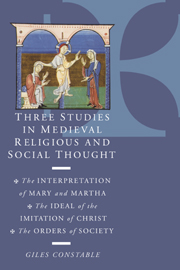 Three Studies in Medieval Religious and Social Thought
Three Studies in Medieval Religious and Social Thought Book contents
- Frontmatter
- Contents
- List of illustrations
- Preface
- List of abbreviations
- I THE INTERPRETATION OF MARY AND MARTHA
- II THE IDEAL OF THE IMITATION OF CHRIST
- III THE ORDERS OF SOCIETY
- Introduction
- The early Middle Ages
- The eleventh and twelfth centuries
- From the twelfth century to the end of the Middle Ages
- Appendix: mediocres (mediani, medii) in the Middle Ages
- Bibliography of secondary works
- Index of manuscripts
- Biblical index
- General index
Introduction
Published online by Cambridge University Press: 08 December 2009
- Frontmatter
- Contents
- List of illustrations
- Preface
- List of abbreviations
- I THE INTERPRETATION OF MARY AND MARTHA
- II THE IDEAL OF THE IMITATION OF CHRIST
- III THE ORDERS OF SOCIETY
- Introduction
- The early Middle Ages
- The eleventh and twelfth centuries
- From the twelfth century to the end of the Middle Ages
- Appendix: mediocres (mediani, medii) in the Middle Ages
- Bibliography of secondary works
- Index of manuscripts
- Biblical index
- General index
Summary
some sort of classification into categories or groups is found in almost all societies, both now and in the past. People today are divided into upper, middle (with upper and lower levels), and lower, or under, classes on the basis of wealth, education, and family; into white and blue collar on the basis of occupation and employment; into right, left, and centre according to their political views; and into countless other groups depending on age, race, religion, gender, marital status, and many other criteria. The precise basis and the purpose of these categories are not always clear, and many of them bear little relation to the realities of how people live and interact. Even their names differ and depend on the point of view and values of those who use them. In different societies they are called classes, strata, castes, orders, and estates, but they all reflect a profound need to understand and to impose order on society.
The fascination of modern society with social distinctions is illustrated in two novels published in 1880 and 1881 respectively by Anthony Trollope and Henry James. The duke of Omnium in The Duke's Children (chapter 8) told his daughter, when she said that she knew no ‘other way of dividing people’ than the category of ‘gentleman’, that ‘You are not called upon to divide people. That division requires so much experience that you are bound in this matter to rely on those to whom your obedience is due.’
- Type
- Chapter
- Information
- Three Studies in Medieval Religious and Social ThoughtThe Interpretation of Mary and Martha, the Ideal of the Imitation of Christ, the Orders of Society, pp. 251 - 266Publisher: Cambridge University PressPrint publication year: 1995
- 2
- Cited by


